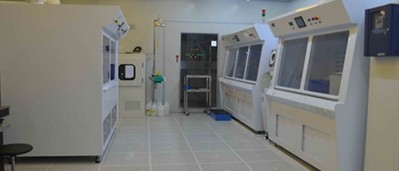Tyco Tianrun embraces industrial transformation
As the core device of electronic products, chips are receiving wider attention than ever before. Innovative and high technologies represented by chips is guiding the industrial transformation and upgrading in Beijing.
Some chip companies have begun to emerge in the domestic and international markets. Among them, Tyco Tianrun Semiconductor, the first Chinese silicon carbide chip company, is particularly eye-catching.
A new type of chip
Semiconductor technologies encountered some bottlenecks after developing for nearly half a century, and replacing semiconductor materials is the most optimal way to break them through.
Take power semiconductors for instance, for chips that are made of traditional silicon materials, it is difficult to improve their switch frequency and poor heat-dissipating. If you want to use chips with higher frequency, you must develop new materials," Tyco Tianrun General Manager Chen Yu remarked.
Therefore, engineers considered to replace the silicon material with a new type of compound material in order to provide users with higher-performance chips.
This is a trend of technological upgrading in the world today, which provides an opportunity for start-up companies and suppliers in China to enter this high-end industry that is often monopolized by big foreign companies.
Currently, silicon carbide chips produced by Tyco Tianran can be installed in all places where electrical energy conversion is involved, such as major household appliances, server power, communications power, rail traffic, electric vehicles, aerospace and so forth.
 |
|
The processing line of Tyco Tianrun Semiconductor. [Photo provided to chinadaily.com.cn] |
Chip manufacturing
Chip manufacturing, the making of an integrated circuit is the most difficult and complex one among all manufacturing industries. A sliver of silicon smaller than a postage stamp can contain billions of transistors, which, acting like switches, are the fundamental active components on the chip.
When conducting chip businesses, difficulties encountered include the fact that the manufacturer of semiconductors made of new materials can’t find many out-sourcing suppliers.
Besides, power semiconductors put more stress on craft than design. The stress on craftsmanship requires manufacturers to control their own production platform, in order to lay a better foundation for later research, development, and cost reduction.
As a new technology, silicon carbide can bring performance improvements, which will lead to the contraction of volume and weight as well as an uptick in efficiency for downstream products.
About competition
In foreign countries, the industry of power semiconductor devices is often regarded as the cornerstone of national strategies. Siemens in Europe, Mitsubishi in Japan, and General Electric in the United States basically monopolized the market in the industry.
At present, the market share of Tyco Tianrun accounts for about 10 percent of the domestic market, including server power, communication power, electric vehicles and charging poles.
To win more customers in this borderless competition, Tyco Tianrun has to compete on quality, services and technologies, for which there are no shortcuts.
Two hundred million yuan to establish a "bridgehead"
Tyco Tianrun has received a lot of attention and assistance in Beijing. The Beijing Municipal Science and Technology Commission and Zhongguancun Administrative Committee offered various channels to support them every year, reducing their cost of development and R&D investment.
The capital of Tyco Tianrun mainly comes from outside sources, government support, and self financing.
The team spent more than two hundred million yuan to occupy a "bridgehead" and build up a solid reputation in the industry. However, to compete with foreign rivals in the long run, they need to invest an additional three to four hundred million yuan.
In the semiconductor manufacturing industry, the process of investing and building a production line will take two to three years, and it will take another five or six years to put it into production.
"Therefore, the most difficult part of our financing process is to convince the investors to accept such a slow process of profit-generating. In many industries, investors can recover their capitals in three to four years, which is impossible in the semiconductor manufacturing industry," Chen noted.
Nevertheless, entrepreneurial values of some industries can't manifest themselves in the form of profits, which is the same case with the semiconductor manufacturing industry.
Though facing so much difficulties, the team of Tyco Tiran still presses forward with indomitable will.
"We're fixing the short board that is vital to making breakthroughs on chip manufacturing and new materials, which is in the interest of current and future generations." Chen added.
